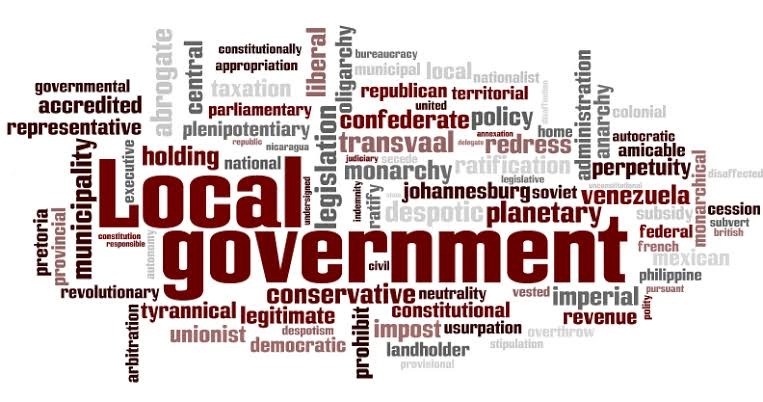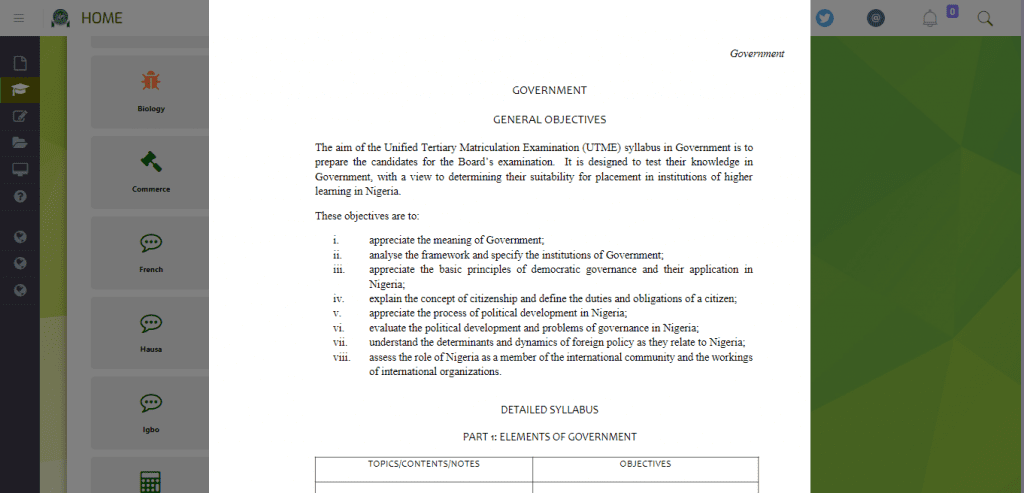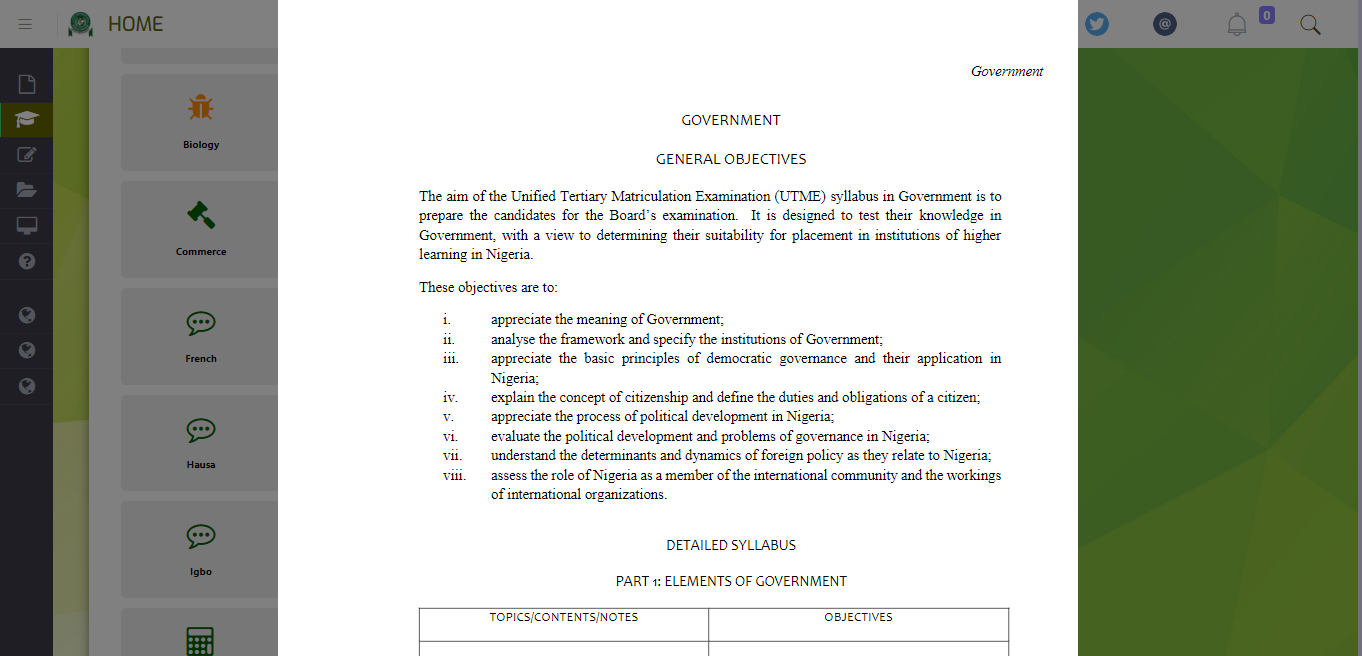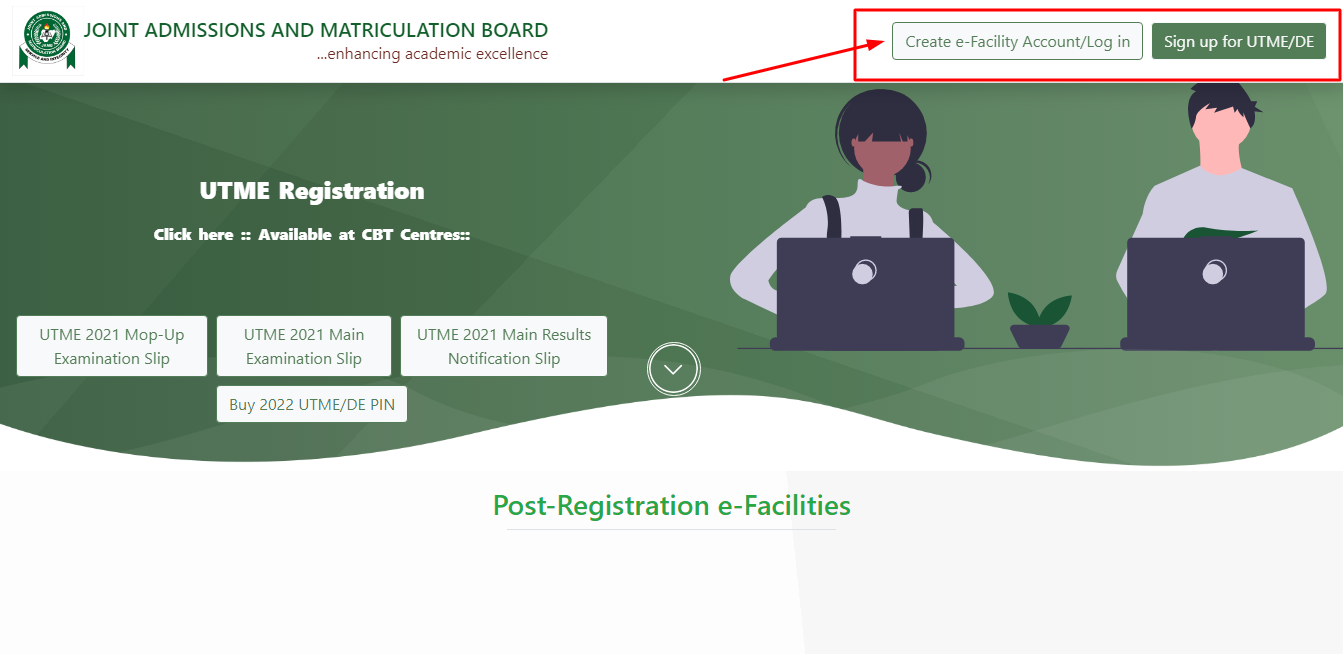JAMB Government Syllabus 2024/2025: Is JAMB Syllabus for Government out for this year’s JAMB?, When will JAMB Government syllabus be out?, JAMB Government Syllabus 2024, What topics do JAMB set questions from Government the most in JAMB?
Welcome SAVANT! to another exciting episode of my “JAMB Doctor Series“, in this episode I will provide you with the official topics recognize by JAMB, which JAMB expect you are a guru in before entering the hall to sit for your JAMB Government Exam. STAY TUNED!

Have you ever wondered where you can find the topics for Government that JAMB asks or the most repeated topics or question in JAMB Government? then you are a step away from finding your answer.
The short answer to the above question is “JAMB Syllabus”, in fact, JAMB Syllabus is the only expo you will be getting as you prepare for 2024/2025 UTME Exams, this syllabus contains area of concentrations and topics your questions will be asked from.
Read Also: WAEC Marking Scheme For All subjects: Grading System 2024/2025
ARE YOU ON TELEGRAM? Subscribe To My Telegram Channel For Frequent Updates & Guide by clicking the "SUBSCRIBE NOW" button below.
Any smart students would cherish this piece (Syllabus) and make effective use of it, the fact that you are searching for this now, simply means you are in the right direction. You should see my top notch guide on How To Pass JAMB With High Score (300+).
For the sake of students who do not fully understand what JAMB syllabus is, I will give a brief explanation about this and then provide you with the relevant topics and area of concentration as provided in JAMB Government Syllabus
I will also make the pdf available for download at the end of this write up… Enjoy!
What Is JAMB Government Syllabus?

JAMB Syllabus for Government is a collection of topics the board expects you to be well grounded in before the exam.
If Government is one of the subjects you will sit for in JAMB, then you need this syllabus, these were actually compiled by JAMB, so it is something you can rely on.
Read also: JAMB Profile 2024/2025: How To Create & Access It (All To Know)
JAMB Government Syllabus

JAMB Government syllabus is designed to evaluate your ability to:
- appreciate the meaning of government;
- analyse the framework and specify the institutions of government;
- appreciate the basic principles of democratic governance and their application in Nigeria;
- explain the concept of citizenship and define the duties and obligations of a citizen;
- appreciate the process of political development in Nigeria;
- evaluate the political development and problems of governance in Nigeria;
- understand the determinants and dynamics of foreign policy as it relates to Nigeria;
- assess the role of Nigeria as a member of the international community and the workings of international organizations.
Download your copy of the syllabus here👇
Below is a detailed list of JAMB Government syllabus/Content
Part 1: Elements Of Government
1. Basic Concepts in Government
Topics:
- Power, Authority, Legitimacy, Sovereignty;
- Society, State, Nation, Nation-State;
- Political Processes; Political Socialization, Political Participation, Political Culture.
2. Forms of Government:
Topics:
- Monarchy, Aristocracy, Oligarchy, Autocracy, Republicanism, Democracy definitions, features, merits and demerits.
3. Arms of Government:
Topics:
- The Legislature – types, structure, functions, powers;
- The Executive – types, functions, powers;
- The Judiciary – functions, powers, components.
- Their relationships
4. Structures of Governance:
Topics:
- Unitary – features, reasons for adoption, merits and demerits
- Federal – features, reasons for adoption, merits and demerits
- Confederal – features, reasons for adoption, merits and demerits.
5. Systems of Governance:
Topics:
- Presidential, Parliamentary and Monarchical.
6. Political Ideologies:
Topics:
- Communalism, Feudalism, Capitalism, Socialism, Communism, Totalitarianism, Fascism, Nazism.
7. Constitution:
Topics:
- Meaning, Sources, Functions, Types – Written, Unwritten, Rigid and Flexible.
8. Principles of Democratic Government:
Topics:
- Ethics and Accountability in Public Office, Separation of Power, Checks and Balances, Individual and Collective Responsibility, Constitutionalism, Rule of Law, Representative Government.
9. Processes of Legislation:
Topics:
- Legislative Enactments – acts, edicts, bye-laws, delegated legislation, decrees.
10. Citizenship:
Topics:
- Meaning, types;
- Citizenship rights;
- Dual citizenship, renunciation, deprivation;
- Duties and obligations of citizens;
- Duties and obligations of the state.
11. The Electoral Process:
Topics:
- Suffrage – evolution, types;
- Election – types, ingredients of free and fair election;
- Electoral System – types, advantages and disadvantages of each;
- Electoral Commission – functions, problems.
12. Political Parties and Party Systems:
Topics:
- Political parties – Definition, Organization, functions.
- Party Systems – Definition, organization, functions.
13. Pressure Groups:
Topics:
- Definition, types, functions and modes of operation.
- Differences between Pressure Groups and Political Parties.
14. Public Opinion:
Topics:
- Meaning, formation and measurement.
- Functions and limitations.
15. The Civil Service:
Topics:
- Definition, characteristics, functions, structure, control and problems.
Part 2: Political Development In Nigeria
1. Pre – colonial Polities:
Topics:
- Pre-jihad Hausa, Emirate, Tiv, Igbo, Yoruba
- a. Their structural organization;
- b. The functions of their various political institutions.
2. Imperialist Penetration:
Topics:
- The British process of acquisition – trade, missionary activities, company rule, crown colony, protectorate;
- The British colonial administrative policy – direct and indirect rule;
- The French colonial administrative policy – assimilation and association;
- Impact of British colonial rule- economic, political, socio-cultural;
- Comparison of British and French colonial administration.
3. Process of Decolonization:
Topics:
- Nationalism – Meaning, Types;
- Nationalist Movements – emergence, goals, strategies;
- Nationalist Leaders – Herbert Macaulay, Nnamdi Azikiwe, Obafemi Awolowo, Ahmadu Bello, Ladipo Solanke, Aminu Kano, J. S. Tarka, Tafawa Balewa and others;
- Emergence of nationalist parties;
- Influence of external factors.
4. Constitutional Development in Nigeria:
Topics:
- Hugh Clifford Constitution (1922)
- Arthur Richards Constitution (1946)
- John Macpherson Constitution (1951)
- Oliver Lyttleton Constitution (1954)
- Independence Constitution (1960)
- Their features, merits and demerits.
5. Post – Independence Constitutions:
Topics:
- 1963, 1979, 1989 and 1999 – characteristics and shortcomings.
6. Institutions of Government in the Post – Independence Nigeria:
Topics:
- The Legislative – structure, functions and working.
- The Executive – structure, functions and workings.
- The Judiciary – structure, functions and workings.
7. Public Commissions Established by the 1979 and Subsequent Constitutions:
Topics:
- The Civil Service Commission, the Public Complaints Commission, Electoral Commissions, National Boundary Commission and others – objectives functions and problems.
8. Political Parties and Party Politics in Post-Independence Nigeria:
Topics:
- First Republic
- Second Republic
- Third Republic
- Fourth Republic – Evolution, membership spread, structure etc.
9. The Structure and Workings of Nigerian Federalism:
Topics:
- Rationale for a Federal System;
- Tiers of government and their relationship;
- Creation of States – 1963, 1967, 1976, 1987, 1991, 1996;
- Problems of Nigerian Federalism – census, revenue allocation, conflicts etc. solutions e.g. Federal character, etc.
10. Public Corporations and Parastatals:
Topics:
- Definition, types, purpose and functions;
- Finance, control and problems;
- Deregulation, privatization, commercialization – objectives, features, merits and demerits;
- Comparison between public corporations and parastatals.
11. Local Government:
Topics:
- Local government administration prior to 1976;
- Features of local government reforms (1976, 1989) – structure, functions, finance and inter-governmental relations;
- Traditional rulers and local governments;
- Problems of local government administration in Nigeria.
12. The Military in Nigerian Politics:
Topics:
- Factors that led to military intervention;
- Structure of military regimes;
- Impact of military rule – political, e.g creation of states, introduction of unitary system (Unification Decree NO. 34) etc. economic, e.g SAP, etc.
- Processes of military disengagement.
Part 3: Foreign Policy & Nigeria’s relations With The International Community
1. Foreign Policy:
Topics:
- Definition, purpose, determining factors; formulation and implementation.
2. Nigeria’s Foreign Policy:
Topics:
- Relations with major powers;
- Relations with developing countries, e.g the Technical Aid Corps (TAC), etc.
- Nigeria’s Non-Alignment Policy.
3. Relations with African Countries:
Topics:
- Africa as the “centre piece” of Nigeria’s forieign policy – guiding principles, implementation and implications;
- NEPAD – origin, objectives and implications.
4. Nigeria in International Organizations
Topics:
- The United Nations;
- The Commonwealth;
- The Organization of African Unity;
- The African Union;
- The Economic Community of West African States (ECOWAS);
- The Organization of Petroleum Exporting Countries (OPEC).
Part 4: International Organizations:
1. International Organizations:
Topics:
- ECOWAS;
- OAU, AU;
- Commonwealth;
- OPEC;
- UNO;
- African Petroleum Producers Association;
- – Origin, objectives, structure, functions, achievements, problems and prospects of these organizations.
Frequently Asked Questions
Number of Questions JAMB Set In Government
The total number of questions JAMB asked in Government is 40, with each question carrying 2.5 marks.
This means if after answering Government, you were able to answer 30 questions correctly in JAMB you have been able to secure 75 marks for yourself.
Recommended Textbooks For Government
To make sure your reading is inline with what your should know, JAMB has prepared a list of textbooks that will help you achieve that purpose, you can find the complete list of JAMB recommended Government Textbooks here.
Is JAMB Government Syllabus Out?
Yes, JAMB syllabus for Government is out and can be accessed here on DrugSavant or on JAMB IBASS.
In Conclusion
It is advisable you go through these topics listed here, as they would help you have a more directed preparation and reading for JAMB Government.
This will be all for now, I understand you may have a question or two to ask, feel free to drop them using the comment box below!
Ensure to share this with friends on Facebook, Whatsapp, or any other social media network you can connect them with…
Related Searches... a. jamb syllabus for government 2023 b. jamb syllabus for government 2023/2024 c. jamb syllabus for government 2022 pdf download d. jamb syllabus for english
JAMB SYLLABUS FOR OTHER SUBJECTS... A. JAMB English Syllabus B. JAMB Mathematics Syllabus C. JAMB Syllabus For Physics D. JAMB Chemistry Syllabus E. JAMB Syllabus For Biology F. JAMB Economics Syllabus G. JAMB Syllabus For Christian Religious Studies (CRS) H. JAMB government Syllabus I. JAMB Syllabus for Commerce J. JAMB Literature in English Syllabus K. JAMB Computer Studies Syllabus



